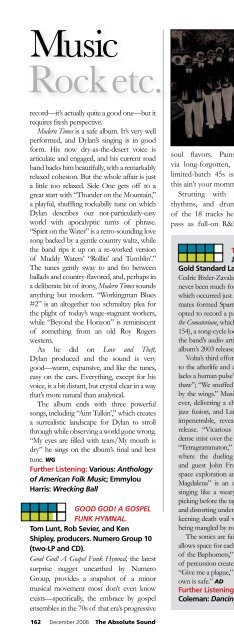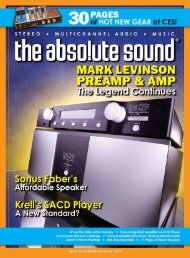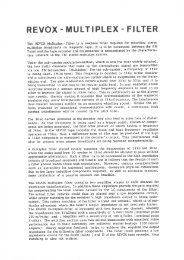You also want an ePaper? Increase the reach of your titles
YUMPU automatically turns print PDFs into web optimized ePapers that Google loves.
Music<br />
Rock etc.<br />
record—it’s actually quite a good one—but it<br />
requires fresh perspective.<br />
Modern Times is a safe album. It’s very well<br />
performed, and Dylan’s singing is in good<br />
form. His now dry-as-the-desert voice is<br />
articulate and engaged, and his current road<br />
band backs him beautifully, with a remarkably<br />
relaxed cohesion. But the whole affair is just<br />
a little too relaxed. Side One gets off to a<br />
great start with “Thunder on the Mountain,”<br />
a playful, shuffling rockabilly tune on which<br />
Dylan describes our not-particularly-easy<br />
world with apocalyptic turns of phrase.<br />
“Spirit on the Water” is a retro-sounding love<br />
song backed by a gentle country waltz, while<br />
the band rips it up on a re-worked version<br />
of Muddy Waters’ “Rollin’ and Tumblin’.”<br />
The tunes gently sway to and fro between<br />
ballads and country-flavored, and, perhaps in<br />
a deliberate bit of irony, Modern Times sounds<br />
anything but modern. “Workingman Blues<br />
#2” is an altogether too schmaltzy plea for<br />
the plight of today’s wage-stagnant workers,<br />
while “Beyond the Horizon” is reminiscent<br />
of something from an old Roy Rogers<br />
western.<br />
As he did on Love and Theft,<br />
Dylan produced and the sound is very<br />
good—warm, expansive, and like the tunes,<br />
easy on the ears. Everything, except for his<br />
voice, is a bit distant, but crystal clear in a way<br />
that’s more natural than analytical.<br />
The album ends with three powerful<br />
songs, including “Aint Talkin’,” which creates<br />
a surrealistic landscape for Dylan to stroll<br />
through while observing a world gone wrong.<br />
“My eyes are filled with tears/My mouth is<br />
dry” he sings on the album’s final and best<br />
tune. WG<br />
Further Listening: Various: Anthology<br />
of American Folk Music; Emmylou<br />
Harris: Wrecking Ball<br />
Good God! A Gospel<br />
Funk Hymnal.<br />
Tom Lunt, Rob Sevier, and Ken<br />
Shipley, producers. Numero Group 10<br />
(two-LP and CD).<br />
Good God! A Gospel Funk Hymnal, the latest<br />
surprise nugget unearthed by Numero<br />
Group, provides a snapshot of a minor<br />
musical movement most don’t even know<br />
exists—specifically, the embrace by gospel<br />
ensembles in the 70s of that era’s progressive<br />
soul flavors. Painstakingly assembled<br />
via long-forgotten, sometimes-lost, and<br />
limited-batch 45s issued on tiny labels,<br />
this ain’t your momma’s gospel.<br />
Strutting with urban sass, sticky<br />
rhythms, and drumming might, most<br />
of the 18 tracks here could legitimately<br />
pass as full-on R&B sides intended to<br />
complement the work of James Brown<br />
and George Clinton. At heart, they remain<br />
the service to the Lord—the savory lyrics<br />
praising Jesus, the emotions kicking with<br />
adoration, the choruses imbued with<br />
robe-swishing dedication. Nonetheless,<br />
the classic grooves on which they glide are<br />
undeniably funky, more fancy dress-code<br />
nightclub cool than storefront church<br />
safe.<br />
Preacher & the Saints’ “Jesus Rhapsody,<br />
Part I” makes no attempt to stifle its<br />
rocking ways, the familiar refrain predating<br />
the Black Crowes’ hit “Remedy” by 18<br />
years. There’s the Masonic Wonders’<br />
reassuring “I Call Him,” subtly referencing<br />
Wilson Pickett’s “In the Midnight Hour”<br />
as it sweeps the floor with a slick chord<br />
progression that makes dancing shoes<br />
move. The Mighty Voices of Wonder ride<br />
The Mars Volta: Amputechture.<br />
Jonathan Debaun, Robert Carranza, and Paul Fig, producers.<br />
Gold Standard Labs 126 (two-LP and CD).<br />
Cedric Bixler-Zavala and Omar Rodriguez-Lopez, the principles behind the Mars Volta, have<br />
never been much for compromise. Just witness the duo’s late-90s split from At the Drive-In,<br />
which occurred just as the group was beginning to crack the mainstream. While their running<br />
mates formed Sparta, a more conventional rock band, Bixler-Zavala and Rodriguez-Lopez<br />
opted to record a pair of ambitious, death-inspired prog-rock concept albums: De-Loused in<br />
the Comatorium, which was borne of a close friend’s suicide, and Frances the Mute (review, Issue<br />
154), a song-cycle loosely based on a diary discovered in the back seat of a repossessed car by<br />
the band’s audio artist, Jeremy Ward, who died of heroin overdose just a month before the<br />
album’s 2003 release.<br />
Volta’s third effort, Amputechture doesn’t share a similar, unifying thread, though references<br />
to the afterlife and zombification are prevalent: “It<br />
lacks a human pulse”; “Unwrap my corpse and let it<br />
thaw”; “We snuffed ourselves an angel and cut her<br />
by the wings.” Musically, the pair is as inventive as<br />
ever, delivering a chaotic mash-up of heavy-prog,<br />
jazz fusion, and Latin rock that, while sometimes<br />
impenetrable, reveals a mastery of tension and<br />
release. “Vicarious Atonement” drifts in like a<br />
dense mist over the river Styx before giving way to<br />
“Tetragrammaton,” a 17-minute six-string workout<br />
where the dueling guitars of Rodriguez-Lopez<br />
and guest John Frusciante ride the line between<br />
space exploration and intergalactic warfare. “Asilos<br />
Magdalena” is an acoustic wonder, Bixler-Zavala<br />
singing like a weary gaucho over sparse acoustic<br />
picking before the tape begins to deteriorate, melting<br />
and distorting under a white-hot Frusciante riff. “Meccamputechture” merges Bixler-Zavala’s<br />
keening death wail with finger-numbing fretwork and a coda that sounds like a jazz quartet<br />
being mangled by robots.<br />
The sonics are fairly exceptional, with the vinyl pressing exhibiting a wide soundstage that<br />
allows space for each instrument to unwind in the sometimes dense tapestries. Witness “Day<br />
of the Baphomets,” where asphalt-crushing bass, spider web guitar, and a tropical rainstorm<br />
of percussion create a cyclone that sounds like it could tear the listener’s living room asunder.<br />
“Give me a plague,” Bixler-Zavala squeals, zeroing in on the sonic devastation. “Nothing you<br />
own is safe.” AD<br />
Further Listening: At the Drive-In: Relationship of Command; Ornette<br />
Coleman: Dancing In Your Head<br />
162 December 2006 The Absolute Sound










